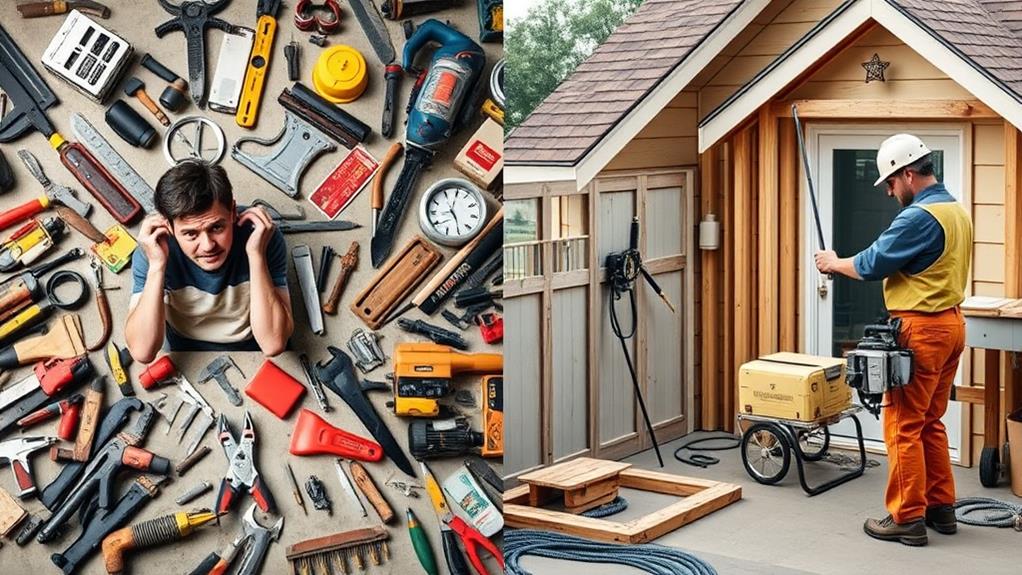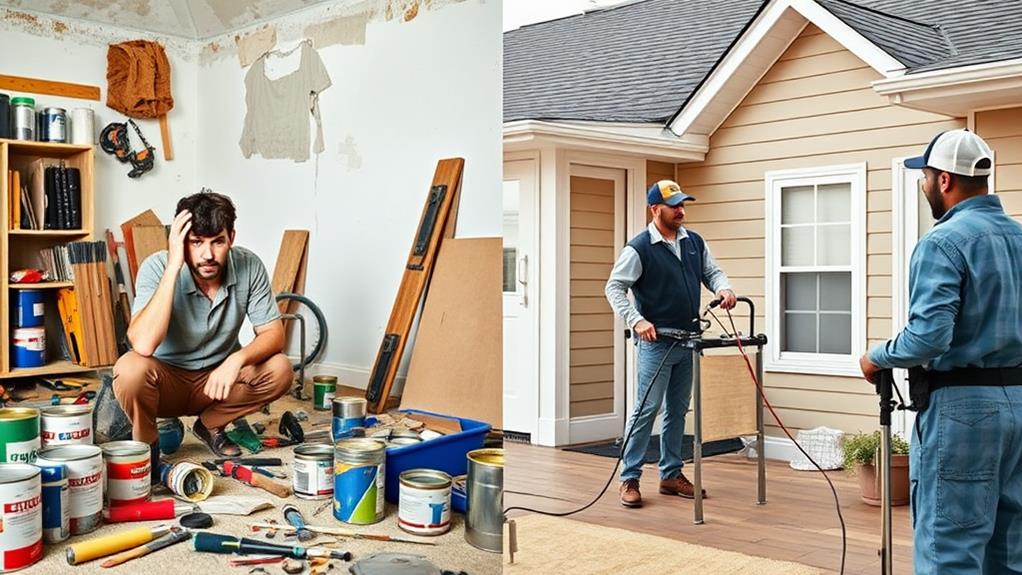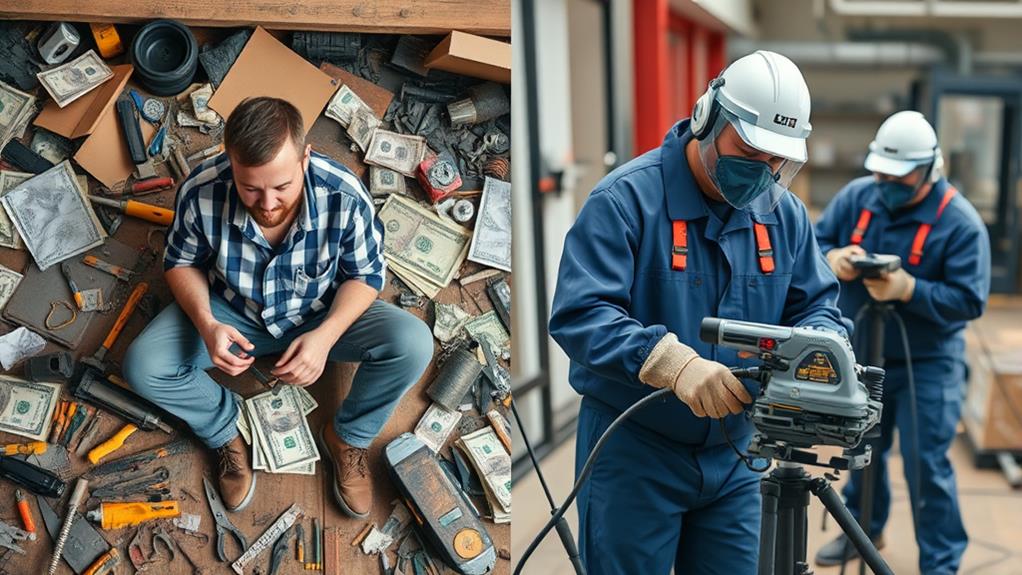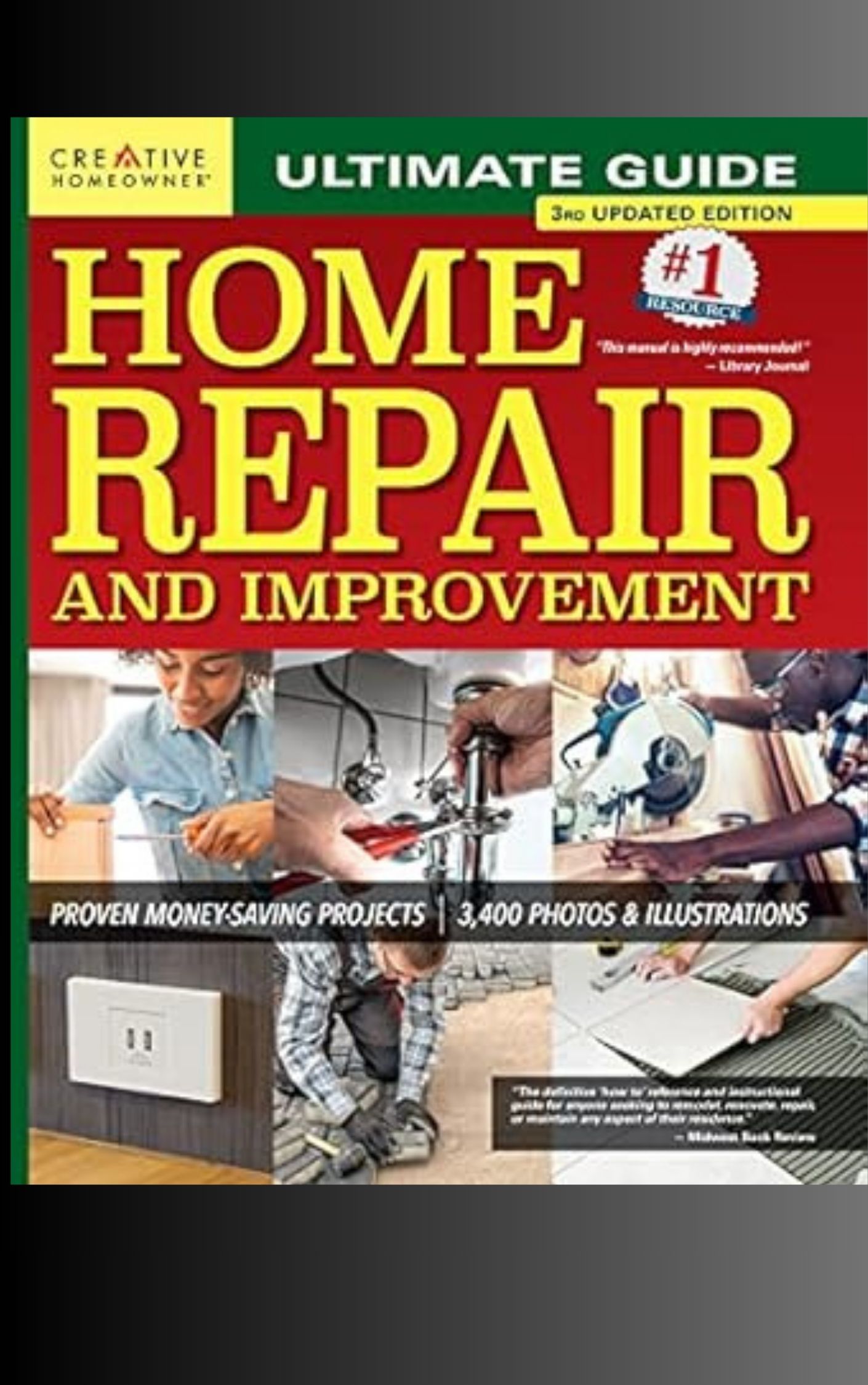When budgeting for DIY versus hiring professionals, consider project complexity, tools and materials costs, time investment, quality factors, and hidden expenses. DIY can save money upfront but may require specialized skills, tools, and more time. Professional services often ensure code compliance and higher quality but come at a premium. Factor in potential DIY errors, safety risks, and long-term maintenance costs. Assess your skills, available time, and desired outcome realistically. For complex projects, hiring pros may prove more cost-effective in the long run. Careful analysis of all aspects will help determine the most suitable and economical approach for your specific situation.
Assessing Project Complexity

When embarking on a home improvement project, accurately assessing its complexity is crucial for determining whether to pursue a DIY approach or hire professionals. Several factors contribute to project complexity, including technical skill requirements, time commitment, safety considerations, and specialized tools needed.
Simple projects like painting a room or assembling furniture typically fall within the DIY realm. These tasks require minimal expertise and can be completed with basic tools. However, projects involving electrical work, plumbing, or structural changes often demand professional intervention due to safety risks and legal requirements.
To evaluate complexity, research the project thoroughly, breaking it down into specific tasks. Consult online resources, home improvement guides, and experienced friends or family members. Consider your personal skills, available time, and willingness to learn new techniques. Be realistic about potential challenges and the consequences of mistakes.
Additionally, factor in the cost of tools and materials. Some projects may require expensive equipment that professionals already possess, making hiring experts more cost-effective in the long run. Ultimately, a careful assessment of project complexity will guide your decision-making process and help you budget appropriately.
Tools and Materials Costs
Building on the assessment of project complexity, the costs associated with tools and materials play a significant role in determining whether to pursue a DIY approach or hire professionals. DIY projects often require purchasing or renting specialized tools, which can quickly add up, especially for one-time use. Professional contractors, on the other hand, typically own the necessary equipment, spreading the cost across multiple projects.
Material costs can vary significantly between DIY and professional approaches. While DIY enthusiasts may benefit from retail prices and sales, professionals often have access to trade discounts and bulk purchasing options. However, DIY projects may lead to overbuying or waste due to inexperience, potentially offsetting these savings.
Quality considerations also impact costs. Professionals may opt for higher-grade materials that offer better durability and performance, potentially increasing upfront expenses but reducing long-term maintenance costs. DIYers might choose less expensive alternatives, which could result in more frequent replacements or repairs.
When budgeting, it's crucial to research thoroughly and compare the total costs of tools and materials for both DIY and professional options, factoring in potential waste, quality differences, and long-term value.
Time Investment Considerations

Time, often considered the most valuable resource, plays a crucial role in deciding between DIY and professional approaches to home improvement projects. When opting for DIY, homeowners must carefully evaluate the hours required to complete the task, factoring in research, planning, execution, and potential setbacks. This time commitment can be substantial, especially for complex projects or those requiring specialized skills.
Conversely, hiring professionals typically results in faster project completion, as they bring expertise and efficiency to the job. However, this time savings comes at a financial cost. Homeowners should weigh the opportunity cost of their time against the expense of hiring professionals. For those with demanding schedules or limited DIY experience, the time saved by hiring experts may justify the additional expense.
It's essential to consider long-term time investments as well. DIY projects may require ongoing maintenance or repairs if not executed properly, potentially consuming more time in the future. Professional work often comes with warranties and guarantees, reducing the likelihood of time-consuming issues down the line. Ultimately, the decision between DIY and hiring professionals should balance immediate time commitments with long-term time considerations and overall project quality.
Quality and Longevity Factors
Beyond time considerations, the quality of work and its longevity significantly impact the decision between DIY and professional approaches. Professional contractors typically possess extensive experience, specialized tools, and in-depth knowledge of industry standards, often resulting in higher-quality outcomes.
Their work is more likely to meet or exceed local building codes and regulations, potentially increasing the lifespan of the project and its overall value.
DIY projects, while potentially cost-effective, may suffer from quality issues due to lack of expertise or proper equipment. Homeowners might inadvertently use subpar materials or employ improper techniques, leading to premature wear, structural problems, or safety hazards.
However, motivated DIYers can achieve professional-level results through thorough research, careful planning, and meticulous execution.
When budgeting, it's crucial to factor in the potential need for future repairs or replacements. A professionally completed project may have a higher upfront cost but could prove more economical in the long run due to superior durability and fewer maintenance requirements.
Conversely, a well-executed DIY project can offer satisfactory quality and longevity while keeping initial expenses low, provided the homeowner has the necessary skills and dedication.
Hidden Expenses and Risks

When considering the financial implications of DIY versus professional work, it's crucial to account for hidden expenses and potential risks that may not be immediately apparent. DIY projects often incur unforeseen costs, such as specialized tools, additional materials, or repairs for mistakes. These expenses can quickly accumulate, potentially exceeding the initial savings of not hiring a professional.
Moreover, DIY enthusiasts may underestimate the complexity of certain tasks, leading to costly errors or safety hazards. Electrical work, plumbing, and structural modifications are particularly risky areas for amateurs. In contrast, professionals carry insurance and warranties, protecting homeowners from liability and ensuring quality results.
Time is another hidden cost often overlooked in DIY projects. What might take a professional a few hours could extend to days or weeks for a novice, impacting daily life and potentially requiring time off work. Additionally, improper DIY work may decrease property value or necessitate expensive corrections by professionals later.
Hiring experts may seem more expensive upfront, but it often proves more cost-effective in the long run, considering the reduced risk of errors, faster completion times, and peace of mind.
Frequently Asked Questions
How Do I Find Reliable Professionals for Home Improvement Projects?
To find reliable professionals for home improvement projects, utilize online review platforms, ask for recommendations from friends and family, check local trade associations, verify licenses and insurance, and request multiple quotes before making a decision.
Are There Tax Benefits for DIY Home Improvements Versus Hiring Professionals?
In a nutshell, tax benefits for home improvements generally don't hinge on whether you DIY or hire professionals. However, keep meticulous records of expenses and consult a tax professional to maximize potential deductions for your specific situation.
What Insurance Considerations Should I Keep in Mind for DIY Projects?
When undertaking DIY projects, consider updating your homeowners insurance to cover potential accidents or damages. Verify if your policy covers DIY work, and consider additional liability coverage. Some projects may require specialized insurance or permits for legal compliance.
How Can I Effectively Negotiate Prices With Contractors?
To effectively negotiate with contractors, research market rates, obtain multiple bids, clearly define project scope, and be prepared to discuss specifics. Demonstrate flexibility, consider value over price alone, and maintain open communication throughout the negotiation process.
Are There Any Eco-Friendly Alternatives for Common Home Improvement Materials?
Yes, numerous eco-friendly alternatives exist for common home improvement materials. Options include recycled steel, bamboo flooring, reclaimed wood, low-VOC paints, recycled glass countertops, cork flooring, and energy-efficient appliances. These choices can significantly reduce your home's environmental impact.
Conclusion
In the tug-of-war between DIY and professional services, careful consideration of project complexity, costs, time investment, quality, and potential risks is paramount. While DIY can offer significant savings, it may come at the expense of expertise and efficiency. Conversely, hiring professionals ensures quality but often at a higher price point. Ultimately, the decision hinges on a delicate balance of budget, skill level, and desired outcomes, with each approach having its own merits and pitfalls.

